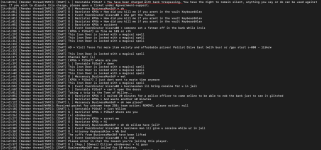Dartanboy
Citizen
Supporter
3rd Anniversary
Change Maker
Popular in the Polls
Legal Eagle
Dartanboy
Attorney
- Joined
- May 10, 2022
- Messages
- 1,706
- Thread Author
- #1
IN THE DISTRICT COURT OF THE COMMONWEALTH OF REDMONT
CIVIL ACTION
KP56 (Solid Law Firm representing)
Plaintiff
v.
Commonwealth of Redmont
Defendant
COMPLAINT
The Plaintiff complains against the Defendant as follows:
On May 23, 2022, the Plaintiff was arrested and apparently fined for the crime of Bank Robbery, however the Plaintiff did not rob the bank. The DOJ did not fix this after a ticket was made with them.
I. PARTIES
1. KB56 (Plaintiff)
2. PiOs67 (Police on scene)
3. xEndeavour (Staff member who helped fix a bug)
4. Milqy (Public advocate who said in a DOJ ticket that the charge stands)
5. The Department of Justice/Commonwealth of Redmont (Defendant)
II. FACTS
1. The Plaintiff broke into the Bank Vault.
2. The Plaintiff did not steal or rob from the Bank.
3. Constable PiOs67 claimed to charge the Plaintiff with Bank Trespass, but later charged the Plaintiff with Bank Robbery.
4. The Plaintiff created a DOJ ticket to fix what was assumed to be a mistake.
5. In that ticket, the Plaintiff was told the robbery charge stands.
III. CLAIMS FOR RELIEF
1. The Plaintiff committed Bank Trespass, not Bank Robbery, but was fined for Bank Robbery.
IV. PRAYER FOR RELIEF
The Plaintiff seeks the following from the Defendant:
1. $1000, for being fined $1000 for the wrong crime.
2. $500 in legal fees.
Evidence:
1. Minecraft Log from KP56 (Attached)
2. Screenshot from DOJ Ticket by KP56 (Attached)
3. Staff Ticket Transcript (Attached)
I would also like to note that the screenshot of the transcript comes from my point of view, thus, the time shown is in my local time, not the Plaintiff's.
Consent To Represent:

By making this submission, I agree I understand the penalties of lying in court and the fact that I am subject to perjury should I knowingly make a false statement in court.
DATED: This 23 day of May 2022
CIVIL ACTION
KP56 (Solid Law Firm representing)
Plaintiff
v.
Commonwealth of Redmont
Defendant
COMPLAINT
The Plaintiff complains against the Defendant as follows:
On May 23, 2022, the Plaintiff was arrested and apparently fined for the crime of Bank Robbery, however the Plaintiff did not rob the bank. The DOJ did not fix this after a ticket was made with them.
I. PARTIES
1. KB56 (Plaintiff)
2. PiOs67 (Police on scene)
3. xEndeavour (Staff member who helped fix a bug)
4. Milqy (Public advocate who said in a DOJ ticket that the charge stands)
5. The Department of Justice/Commonwealth of Redmont (Defendant)
II. FACTS
1. The Plaintiff broke into the Bank Vault.
2. The Plaintiff did not steal or rob from the Bank.
3. Constable PiOs67 claimed to charge the Plaintiff with Bank Trespass, but later charged the Plaintiff with Bank Robbery.
4. The Plaintiff created a DOJ ticket to fix what was assumed to be a mistake.
5. In that ticket, the Plaintiff was told the robbery charge stands.
III. CLAIMS FOR RELIEF
1. The Plaintiff committed Bank Trespass, not Bank Robbery, but was fined for Bank Robbery.
IV. PRAYER FOR RELIEF
The Plaintiff seeks the following from the Defendant:
1. $1000, for being fined $1000 for the wrong crime.
2. $500 in legal fees.
Evidence:
1. Minecraft Log from KP56 (Attached)
2. Screenshot from DOJ Ticket by KP56 (Attached)
3. Staff Ticket Transcript (Attached)
I would also like to note that the screenshot of the transcript comes from my point of view, thus, the time shown is in my local time, not the Plaintiff's.
Consent To Represent:
By making this submission, I agree I understand the penalties of lying in court and the fact that I am subject to perjury should I knowingly make a false statement in court.
DATED: This 23 day of May 2022
Attachments
Last edited:









